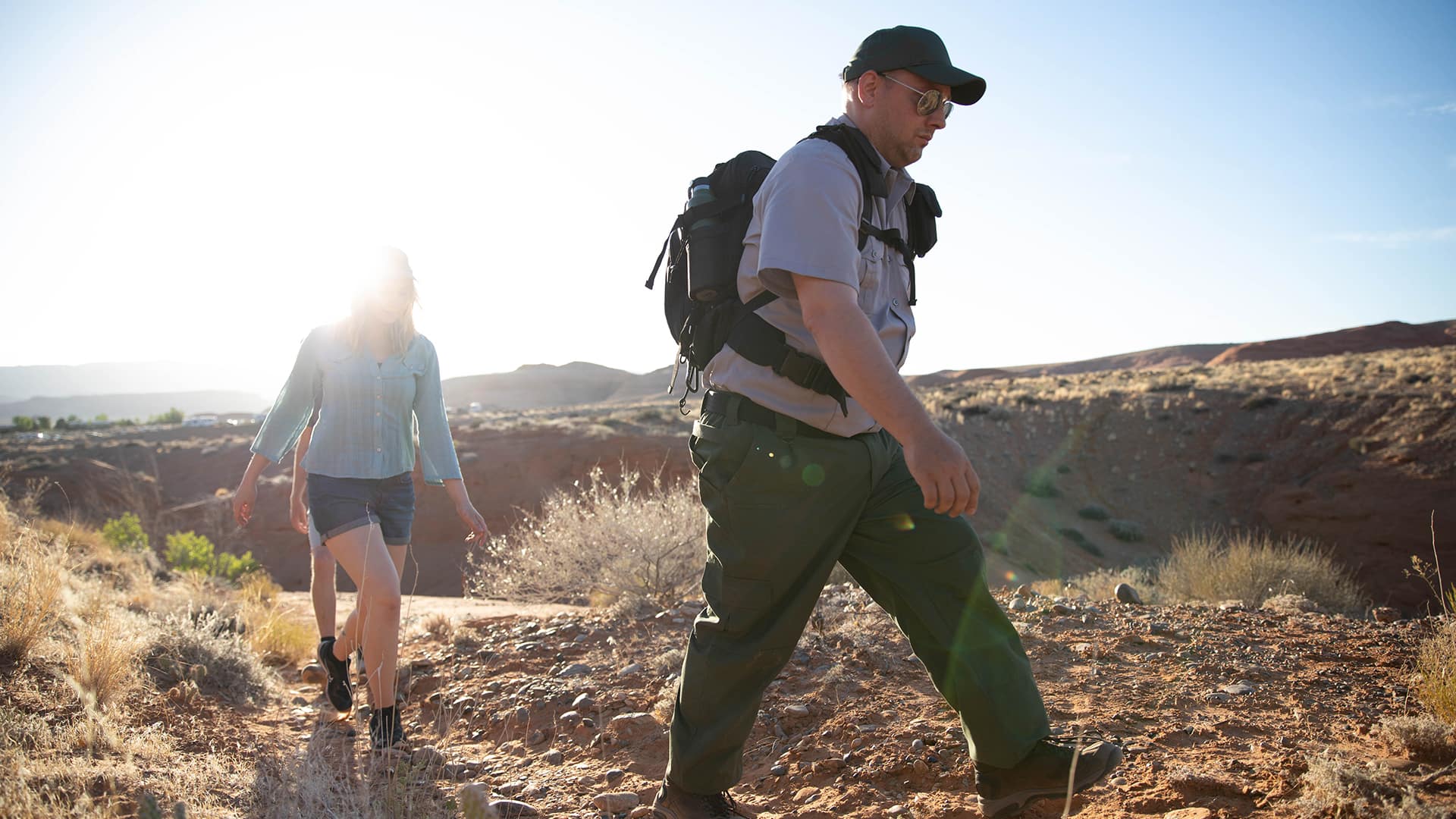Academic Spotlight: Dr. Laman Tasch, Associate Dean of Academic Strategy, Social Sciences
Social Sciences | 7min Read

If you’re fascinated by human behavior, Southern New Hampshire University's Bachelor of Arts (BA) in Anthropology might be the degree for you. This experiential online program bridges the gap between science and the humanities. You'll explore societal similarities and differences through cultural, biological, archaeological and linguistic lenses, while studying society's extensive progress.

This curriculum has a strong foundation in archaeology, ethics and conservation. Its core and concentration classes stress the application of anthropological theory and methods to real-world problems through hands-on assignments, ethnographic case studies, data collection and more.
Whether you dive directly into the field after graduation or continue on to your master's, this program provides the tools, skills and knowledge needed to succeed.
In addition to the general anthropology track, this program offers a career-focused concentration in environmental sustainability.
Southern New Hampshire University's (SNHU) online Bachelor of Arts (BA) in Anthropology with a concentration in Environmental Sustainability aims to help you recognize and respond to cultural and environmental challenges by exploring how the past impacts the present. In this concentration, you'll acquire ethical, practical and technical skills. You'll also learn to view the world through a social, historical and evolutionary lens. Students who pursue this degree generally do so with the goal of better understanding (and thereby protecting) the environment.
Many of the courses in our environmental sustainability concentration use virtual experiences. From role-playing to tourism planning, you'll combine theory and problem-solving skills in an authentic way.
SNHU's environmental sustainability program features a multidisciplinary approach and provides skill sets valued by a range of employers – from urban to rural organizations, private firms to nongovernment organizations (NGOs).
Career outlook:
After earning your online anthropology degree with a concentration in environmental sustainability, you should be able to examine the relationship between human activities and environmental processes. You'll then be able to inform and develop individual and community strategies that mitigate environmental issues and promote sustainable living.
The U.S. Bureau of Labor Statistics reports the median annual salary for environmental scientists and specialists was $78,980 in May 2023, and the employment rate for this field is projected to grow 6% through 2032.1
Courses may include:
If you're interested in turning your passion for the planet into a profession, you may also want to check out our online environmental science degree.
In addition to examining how anthropology helps people understand society, these classes will help you gain widely applicable skills in research methods, statistical analysis, critical thinking and effective communication.
All undergraduate students are required to take general education courses, which are part of SNHU's newly redesigned program, The Commons. The goal of The Commons' curriculum is to empower you with some of the most in-demand skills, so you can succeed not only in your academic career, but in your personal and professional life too.
Minimum Specifications:
Additional Information:
SNHU has provided additional information for programs that educationally prepare students for professional licensure or certification. Learn more about what that means for your program on our licensure and certification disclosure page.
Our no-commitment application can help you decide if SNHU is the right college for you and your career goals. Apply up until 2 days before the term starts!
Upcoming term starts: May 4, 2026 | June 29, 2026
Attending college online at SNHU can be a life-changing experience. In fact, 91.6% of online students would recommend SNHU according to a 2024 survey with 8,000+ respondents.
Our faculty carry with them decades of experience in criminology. By bringing real-world insights to the classroom, they can help position graduates for success in a field that's always changing.
 Dr. Heather York
Dr. Heather York
After earning her bachelor's degree, Dr. Heather York earned a master's and doctorate degree to study human rights-oriented anthropology. Before joining SNHU she studied remains at the Spiro Mounds site in Oklahoma and worked for Physicians for Human Rights in Bosnia-Herzegovina helping to identify victims of the 1992-1995 Bosnian War.
Position
Adjunct Instructor
Joined SNHU
2010
Education
"Some schools have 'first-year experience' plans to help students transition from high school or work to college, but SNHU really goes above and beyond to keep that support network in place throughout our students' college careers."
You’ll take your courses within SNHU’s Brightspace platform. This is where you’ll find your:

At Southern New Hampshire University, you'll have access to a powerful network of more than 400,000 students, alumni and staff that can help support you long after graduation. Our instructors offer relevant, real-world expertise to help you understand and navigate the field. Plus, with our growing, nationwide alumni network, you'll have the potential to tap into a number of internship and career opportunities.
Recently, SNHU has been nationally recognized for leading the way toward more innovative, affordable and achievable education:
Founded in 1932, Southern New Hampshire University is a private, nonprofit institution with over 250,000 graduates across the country. SNHU is accredited by the regional accreditor New England Commission of Higher Education (NECHE), which advocates for institutional improvement and public assurance of quality.
No application fee. No test scores. And no college essay. Just a simple form with basic information. It’s another way SNHU helps you reach your goals sooner.
It's easy, fast and free.
Whether you're applying for an undergraduate or graduate degree, you’ll fill out a form to verify your previous education experience. As part of our admissions process, we'll help you request transcripts from your previous school(s) to see if you can transfer any credits into your SNHU program! (Also for free!)
After reviewing your official evaluation, you can decide if SNHU is right for you! If you choose to enroll, just pick your start date and get ready for classes to begin.
Talk to an admission counselor: 888.327.SNHU | enroll@snhu.edu
SNHU is accredited by the regional accreditor the New England Commission of Higher Education (NECHE). The university also carries specialized accreditations for some programs.

As a nonprofit university, SNHU offers some of the lowest online tuition rates in the country. And when you work with our Financial Services team, we'll explore ways to help you save even more on your education – and customize a payment plan that works for you.
*before previously earned credits are applied
Tuition rates are subject to change and are reviewed annually.
**Note: Students receiving this rate are not eligible for additional discounts.
Additional costs: Course materials vary by course.
If 30 of your prior learning credits ($342/credit) are accepted toward your bachelor’s degree.
Your remaining tuition cost: $30,780
If 45 of your prior learning credits ($342/credit) are accepted toward your bachelor’s degree.
Your remaining tuition cost: $25,650
If 60 of your prior learning credits ($342/credit) are accepted toward your bachelor’s degree.
Your remaining tuition cost: $20,520
If 75 of your prior learning credits ($342/credit) are accepted toward your bachelor’s degree.
Your remaining tuition cost: $15,390
If 90 of your prior learning credits ($342/credit) are accepted toward your bachelor’s degree.
Your remaining tuition cost: $10,260
How we estimate your tuition cost:
We look at the cost per credit multiplied by the number of credits you need to earn for a bachelor's degree. Most bachelor's degrees require 120 credits. SNHU allows you to transfer in up to 90 credits, requiring a minimum of 30 credits to be taken at SNHU. This is only a tuition estimator, and doesn't account for other fees that may be associated with your program of choice.
Transfer up to 90 credits toward your bachelor's degree program at SNHU. If you’ve taken one course or many, we’ll evaluate them for you.
Fill out the FAFSA to see if you’re eligible for grants or work-study. (You could also be offered loans, though you’ll have to pay those back later.)
Earn credits in leadership, technology and more – while taking advantage of tuition discounts for active-duty service members and spouses.
Getting free money for college – from SNHU or an outside organization – could help you save hundreds or even thousands of dollars.
Bring in credits from popular options like CLEP, Sophia Learning, Google and other common credit for prior learning (CPL) experiences.
Learn how you can save money with tuition reimbursement from your employer.
Take advantage of an online tuition discount through your organization’s partnership with SNHU. Check with your employer to see if your organization partners with us and if you’re eligible for additional tuition savings and partner education benefits.
An online anthropology degree can help you develop a broad range of marketable skills and make a difference on teams with advertising, diversity, human resources, user experience and social justice focuses.
Anthropologists can be found in a wide range of roles all around the world – including the below. However, it's important to note some may require an advanced degree.
Study the origin, development and behavior of humans, alongside the culture of past and present civilizations.
Use your knowledge of the natural sciences to protect the environment and human health.
Manage heritage assets and other cultural resources, such as contemporary art.
Ensure the fair and equal treatment of all citizens, and investigate and document violations.
Collect, organize and analyze data to solve problems and identify and predict trends.
Create interactive programs that enhance a user's experience with a brand.
Increase nationally in roles for anthropologists and archeologists through 2032, projected by the U.S. Bureau of Labor Statistics (BLS).1
Median annual pay nationally for anthropologists and archeologists as of May 2023, according to the BLS.1 Statistic not based on wage data for SNHU graduates.
Note: These roles typically require an advanced degree.
Understanding the numbers
When reviewing job growth and salary information, it’s important to remember that actual numbers can vary due to many different factors—like years of experience in the role, industry of employment, geographic location, worker skill and economic conditions. Cited projections are based on Bureau of Labor Statistics data, not on SNHU graduate outcomes, and do not guarantee actual salary or job growth.

I saw that the tuition rate was really affordable, and I looked at the learning platform and it was really easy to use. It was a very easy decision to make.
Lisa Rogers '24
Simply put, anthropology is the study of what makes us human.2 Anthropologists study every aspect of the human experience, from biological makeup to the evolution of society. As you can imagine, that's a lot of ground to cover for 1 anthropologist. That's why the field is generally divided into 4 subfields, which utilize distinct skillsets alongside foundational anthropology techniques and methods. Archaeology, or anthropological archaeology, is 1 of those 4 subfields.
Much like anthropologists, archaeologists study human culture. The only difference is they study human culture of the past rather than the present. They do so by examining and analyzing artifacts excavated from archaeological sites in order to understand to what daily life was like. Archaeologists can even determine the types of diets and diseases humans may have experienced through excavated bones and teeth. In addition to excavating sites, archaeologists also manage and preserve sites and artifacts.
The other 3 subfields of anthropology include biological anthropology, cultural anthropology and linguistic anthropology. Biological anthropologists examine biology in humans and their non-human primate relatives and ancestors. Cultural anthropologists look at modern cultures and the effects of overpopulation, natural disasters, war and poverty on society. Linguistic anthropologists explore the past, present and future of languages, focusing on its use and impact on culture and social relationships.
Absolutely! At Southern New Hampshire University (SNHU), we believe higher education should be accessible and affordable. With an online Bachelor of Arts (BA) in Anthropology degree, you can study the human experience on your schedule, with no set class times and 24/7 online access to coursework. You can also enjoy some of the lowest online tuition rates in the country.

Dr. Kelley Sams, an anthropology and public health instructor at SNHU, had some helpful advice for up-and-coming students looking to pursue their online degree.
"Succeeding in online learning has a lot to do with good time management. I encourage students to really think about how to use the 24 hours they each get every day," she said. "At the beginning of each term, each week and each day, make a plan. Decide what you want to accomplish in terms of work, relaxation, family time, etc. Think about your priorities and set clear boundaries for yourself."
According to the American Anthropological Association, there are four main career paths for anthropology graduates today:2
Read more about what you can do with an anthropology degree.
According to the U.S. Bureau of Labor Statistics, a bachelor’s degree in anthropology combined with internship experience can lead to positions as a field/lab technician or research assistant.1 Meanwhile, they note overseas work or jobs requiring leadership skills and complex technical knowledge usually call for an advanced degree.1
For Whitney Wheeler ’19, who made up her mind to become a marine archaeologist while working at Atlanta’s Georgia Aquarium, a bachelor’s degree in anthropology was the first step on her career path.
Heather York also tried on 2 other majors before switching to anthropology. The deciding factor was the Introduction to Cultural Anthropology and Human Origins and Evolution courses she took midway through her sophomore year. Today, she teaches those same courses as an adjunct instructor at SNHU, bringing her real-life experience to the field of anthropology.
The U.S. Bureau of Labor Statistics projects a 4% growth in employment for anthropologists and archeologists through 2032.1
Some of this demand will come from corporations who use anthropological research to analyze consumer demand within cultural or social groups.1 Anthropologists in corporate settings delve into specific markets to help businesses serve their clients better or target new customers.1
Environmental sustainability focuses on helping people live more efficiently and effectively in their environment. Graduates of Southern New Hampshire University's online bachelor’s in anthropology with a concentration in environmental sustainability learn to become stewards of the natural world who are prepared to enter the booming green economy.
Our program features a multidisciplinary approach and provides skill sets valued by a range of employers – from urban to rural organizations, private firms to nongovernment organizations (NGOs).
1Bureau of Labor Statistics, U.S. Department of Labor, Occupational Outlook Handbook, on the internet, at:
Cited projections may not reflect local and/or short-term economic or job conditions and do not guarantee actual job growth.
2American Anthropological Association, Careers in Anthropology, on the internet, at: